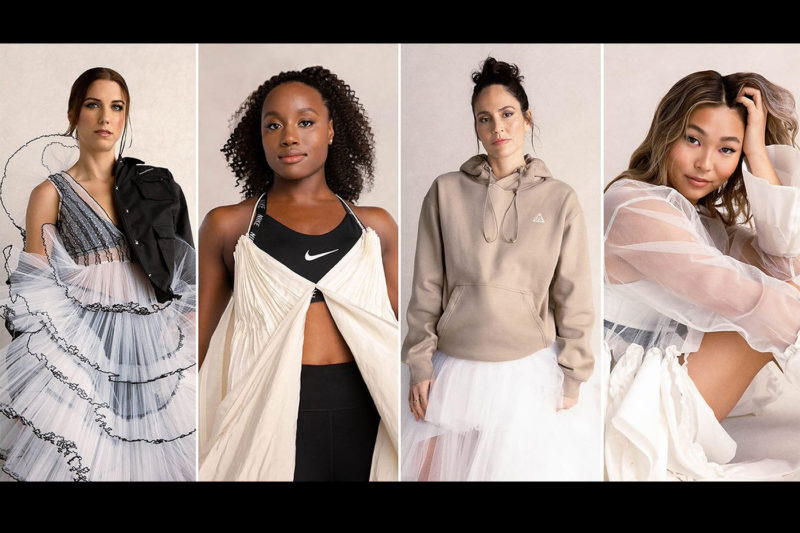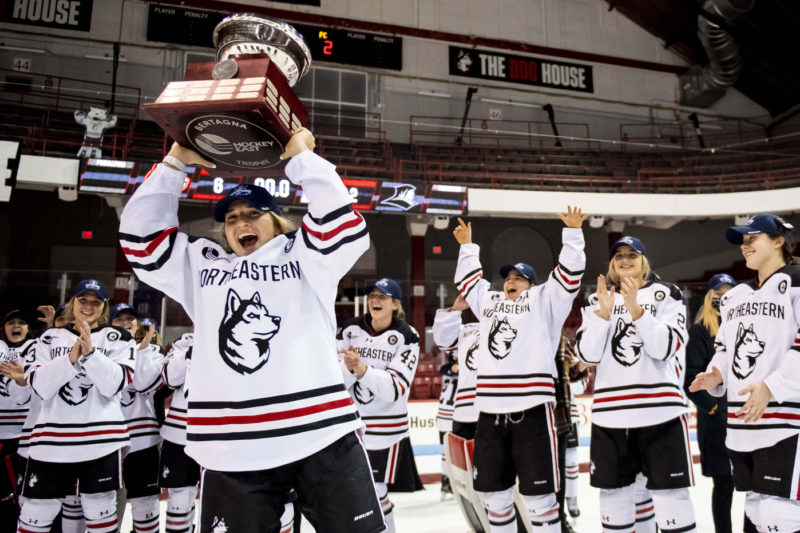
By: Ian Thomsen
The four athletes weren’t going to wait any longer to be granted equality. They decided to seize it.
Alex Morgan (soccer), Sue Bird (basketball), Simone Manuel (swimming), and Chloe Kim (snowboarding)—each an international star in her sport—announced last week that they have created TOGETHXR, a media and commerce company built to promote women in sports and the media.
The idea is long overdue, says Lisa Markland, a former track-and-field star at Northeastern who has assisted the Center for the Study of Sport in Society for more than 15 years as a social justice facilitator.

Aerin Frankel, the All-American goaltender of Northeastern’s ice hockey team. Photo by Ruby Wallau/Northeastern University
“It’s sad that they had to say we can’t wait any longer, we have to be the ones to take this baton and run with it,” says Markland, the Pete Fox Director of Student Athlete Development at Team IMPACT, a charity that pairs children facing serious and chronic illnesses with college athletic teams. “But that is pretty much how it’s gone across our society with any movement. Change doesn’t start to happen until the group that is disenfranchised says, ‘Enough is enough, I’m going to be an advocate for myself, I can no longer wait for anyone to advocate for me.’”
The new athletes’ group views itself in a groundbreaking historical context.
“With a focus on rich storytelling rooted in lifestyle and youth culture, TOGETHXR is an unapologetic platform where representation and equality is the norm,” reads its website. “We shatter the often narrow depictions of women in the media with content featuring a diverse and inclusive community of game-changers, culture-shapers, thought leaders, and barrier breakers.”
By telling their own stories on their own terms, the athletes will provide positive influences for generations of women around the world, says Aerin Frankel, the All-American goaltender of Northeastern’s ice hockey team.
Lisa Markland (left) and Pharlone Toussaint believe TOGETHXR will serve to elevate young women around the world. Courtesy photos
“It’s awesome that they’re taking matters into their own hands because clearly there are disparities that need to change,” says Frankel, who is preparing to lead the No. 1 Huskies into the eight-team NCAA Tournament next week in Erie, Pa. “Little girls will see these role models and will want to be like them.”
The more TOGETHXR succeeds commercially, the greater its impact will be culturally, says Pharlone Toussaint, a former associate of the Center for the Study of Sport in Society.
“What I see are opportunities for new dreams to be dreamed,” says Toussaint, the Atlanta program officer for Laureus USA, a nonprofit organization that supports programs that use sport for social change. “I think about new books to be written, new classes to be taught. There are so many opportunities for young women to see themselves in places that they wouldn’t have been comfortable in before. They should know that this space was made for you—and you absolutely belong here.”
Generations of women athletes have been striving not only to succeed in competition, but also to create opportunities for women in all spheres of society. Such was the context for the women soccer players of the U.S. national team as they were winning world championships and yet being paid less than U.S. men who were failing to contend internationally. A settlement with the U.S. Soccer Federation last year did not address the inequity, which is why U.S. Representatives Doris Matsui of California and Rosa DeLauro of Connecticut introduced a bill Monday that demands equal pay for the women’s national team.

NORTHEASTERN WOMEN’S HOCKEY WON ITS FOURTH STRAIGHT HOCKEY EAST TITLE. IS THE NATIONAL CHAMPIONSHIP NEXT?
READ MORE
“In many cross-sections of life, women are still not seen as being as valid as their male counterparts,” Markland says. “Why is this still happening in our society? Why do we feel like we shouldn’t put money towards advancing the women? We know that really all it takes is money and sponsorship and media time on TV, and women’s sports would be pushed forward.”
During the Black Lives Matter protests of last summer, WNBA players set a standard for all sports leagues by wearing shirts with social justice messaging, kneeling during the national anthem, and taking other actions. Players forced Kelly Loeffler, a former U.S. senator from Georgia, to give up her ownership stake in a WNBA team, the Atlanta Dream, after Loeffler attacked the Black Lives Matter movement.
“Here we are in a moment of reckoning,” says Dan Lebowitz, executive director of the Center for the Study of Sport in Society. “It’s fueled in great part not only by the resounding voice of change—the Black Lives Matter movement and all of the things that are happening around us—but also by the resonating voice of women athletes.”
Toussaint says TOGETHXR is sure to thrive, based on forces of activism that have been building within women’s sports for decades.
“It’s one of those moments where it’s like, what a time to be alive,” Toussaint says. “The landscape is unbelievable: There’s so much rich content that is not being shared or covered, because we’re trying to compete in an arena that was never set up for us to succeed anyway. So it’s just phenomenal to hear that this is happening, and trailblazing for them to be doing it.”
For media inquiries, please contact media@northeastern.edu.